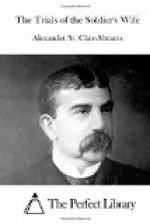As soon as Mrs. Wentworth was left alone, her face assumed its natural appearance, and the rigid expression it had hitherto worn was dispelled. Opening a bundle she had brought front her room, she took out a white dress. It was one of the few remaining articles of clothing she possessed, and had only been saved at the earnest solicitation of the little Ella. It was her bridal robe; in that she had walked up to the altar and plighted her troth to the loved husband who was now a prisoner and far away. The first and last time she had worn it was on that day, and as she gazed on it the memory of the past rushed upon her. She thought of the hour when, as a blushing bride, she leaned on the proud form of her lover, as they walked together in the sacred edifice to register those vows that bound them in an indissoluble tie, and unite their hearts in a stronger and holier love than their lover’s vows had done. Then she know not what sorrow was. No gift of futurity had disclosed to her the wretchedness and penury that after years had prepared for her. No, then all was joy and happiness. As she stood by the side of her lover her maiden face suffused with blushes, and her palpitating heart filled with mingled felicity and anxiety as she looked down on the bridal dress that covered her form. No thought, no dream, not even a fear of what after years would bring to her, stirred the fountain of fear and caused her a single pang. And now—but why trouble the reader with any further remarks of the past? That is gone and forever. We have seen her tread the paths in which all that is dismal and wretched abides; we have seen herself and her children lead a life, the very thought of which should cause us to pray it may never be our lot. Words can avail but little. They only fill the brain with gladness for awhile to turn to horror afterwards. We have but to write of the present. In it we find misery enough, we find sorrow and wretchedness, without the hand of compassion being held forth to help the miserable from the deep and fearful gulf with which penury and want abound.
The wedding dress was soiled and crumpled; the bunches of orange blossoms with which it was adorned, lay crushed upon its folds—a fit appearance for the heart of the owner—It looked like a relic of grandeur shining in the midst of poverty, and as its once gaudy folds rested against the counterpane in the bed, the manifest difference of the two appeared striking and significant.
For a moment Mrs. Wentworth gazed upon this last momento of long past happiness, and a spasm of grief contracted her features. It passed away, however, in an instant, and she laid the dress across the dead body of her child. Drawing a chair to the bedside, she took from her pocket a spool of thread, some needles and her scissors. Selecting one of the needles, she thread it, and pinning it in the body of her dress, removed the wedding gown from the body of her child, and prepared to make a shroud of it. Rapidly she worked at her task, and before darkness had set in, the burial garment was completed, and the body of Ella was enclosed in the last robe she would wear on earth.




